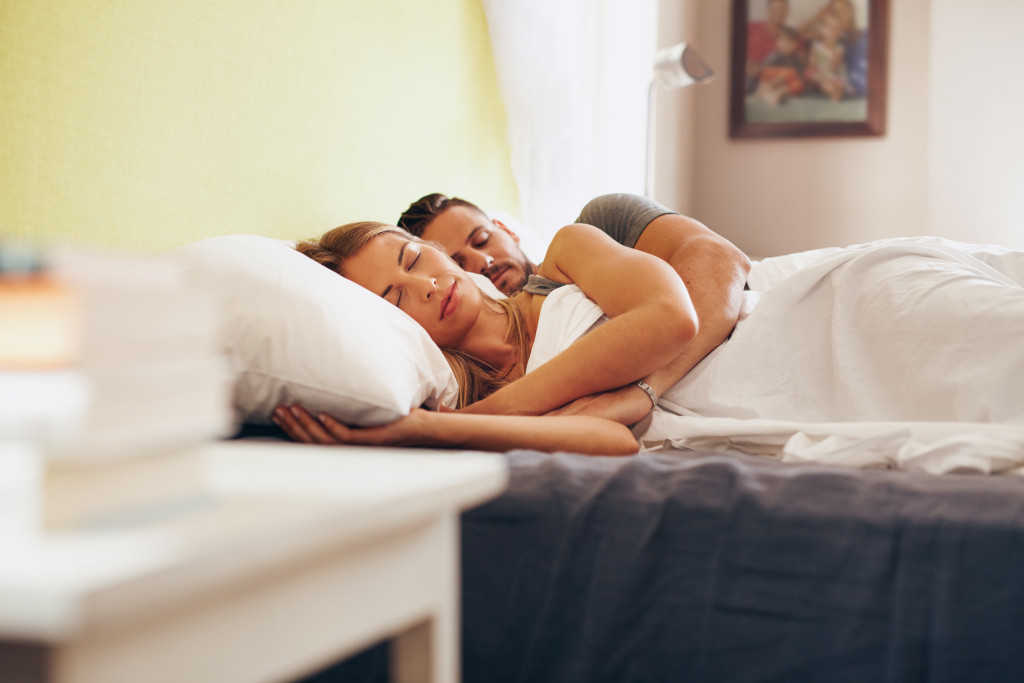Research shows that night sweats affect between 10% and 41% of the population. People who experience night sweats have come to be referred to as “hot sleepers”.
Sweating because of high temperatures is natural. However, if you are frequently or regularly sweating heavily when you sleep, there could be an underlying condition that’s causing it. In which case, you might need to see your doctor for treatment.
What Causes Hot Sleep?
Our body’s internal temperature normally fluctuates within a 24-hour period. This cycle is referred to as circadian rhythm. The body loses warmth right around bedtime and continuously cools down until it reaches its low point approaching daybreak, or around 5 am.
Come nighttime, when the eyes perceive darkness, the hormone melatonin is released in the body. Melatonin triggers feelings of being tired as well as causing the body’s temperature to drop. Even as you fall asleep, the body’s temperature continues to drop to about 2°F (-1°C) to help the body achieve a night of restful sleep.
The body cools down by expanding the skin’s blood vessels. When the body’s temperature begins its descent in the nighttime, that’s when you may notice that your hands and feet feel warmer. This is due to the body’s function of allowing heat to escape through these appendages so your core temperature goes down.
According to Sleep.org, the body’s temperature will begin going back up to its usual level shortly before waking up. Sweating is the body’s natural way of cooling down its core temperature when it reaches a certain point.
The most logical explanation for sweating is high temperature in the bedroom or if you are using heavy bedding or thick mattresses. Other possible causes of hot sleep could be:
- Co-sleeping. Either with another person or with pets.
- Internal body processes like hormonal changes due to hyperthyroidism or menopause in women.
- Eating or exercising too close to bedtime. This ups the body’s metabolic rates which, in turn, disrupts rhythmic temperature control and, ultimately, the quality of sleep.
- Anxiety
In some cases, hot sleeping may be a symptom of an underlying condition, such as:
But these above conditions are likely accompanied by other symptoms, as well.

Best Temperatures for Sleeping
A basic understanding of biorhythms should contribute to your ability to get a good night’s sleep. Follow these tips to achieve optimal temperatures for better sleep patterns.
Regulate room temperature. Maintain room temperature to between 60 and 67°F (or 15.6 and 19.4°C) at night by adjusting the thermostat, improving ventilation, or using fans or air conditioners.
Change beddings according to season changes. While down comforters (or even extra layers) may be perfect for the winter months, it’s best to switch to lightweight blankets during the warm months. Consider lessening clutter like excess pillows in the summer, too.
Avoid caffeine in the afternoon to evening. Drinking coffee, tea, or soda late in the afternoon and well into the evening may contribute to difficulty sleeping at night.
Keep your bedroom dark. Minimize glare from screens or do away with night lamps, if possible. Fit your windows with drapes or curtains especially if you’re working the night shift and you sleep during the day. Wearing a sleep mask over your eyes will help, too.
Keep your bedroom quiet. Keep distractions at a minimum if you are unable to eliminate it altogether. As much as possible, keep devices or gadgets that may hum, buzz, or beep away from the bedroom. Wear earplugs, if necessary.
Set a sleep schedule. The body’s natural circadian rhythm sets a routine that your body follows. Try to adhere to this natural biorhythm as closely as you can and as often as you are able. The simplest way to start this is to go to bed at the same time every night. Turn off those electronic gadgets like phones, tablets, or the television at least 30 minutes before bedtime.
Help your mind and body calm down. Simple exercises such as meditation or breathing exercises will help normalize the body’s stimulation levels. Reading a book will help, too. If sleep music works for you, do keep the volume at really low, relaxing levels.
Ideally, the temperature in your bedroom is kept between 60 and 67°F (15.6 and 19.4°C) which is conducive for a restful sleep. If you have infants with you, this temperature range is optimal for them, as well. Appropriate sleep clothes and minimal to zero distractions likewise contribute to a good night’s rest. If the lifestyle changes are still not enough to help you sleep better, consider seeing a doctor about the hot sleep that persists.




